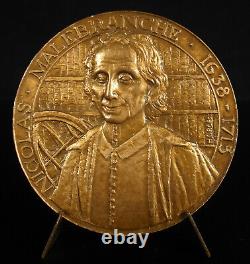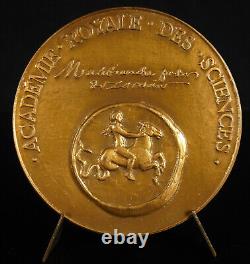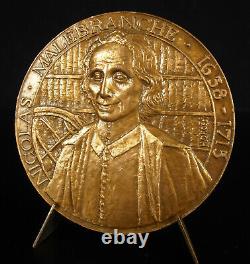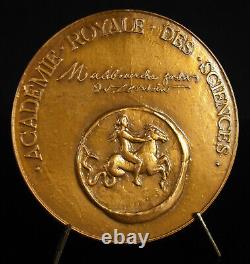Medal Nicolas Malebranche Philosopher H Drops 1960 Academy Royal of Sciences





Bronze medal, of the Paris Mint (Cornucopia hallmark from 1880). Hallmark on the edge (mark on the edge) : cornucopia + bronze.
The stand is not for sale. Nicolas Malebranche, born in Paris on August 6, 1638 where he died on October 13, 1715 (same years of birth and death as the French King Louis XIV), is a French philosopher, Oratorian priest and theologian. In his work, he is led to synthesize the thought of Saint Augustine and that of René Descartes.
He also develops there a deeply original thought, of a great conceptual unity, which integrates the new sciences of the time while wanting to be in conformity with the dogmas of Christianity. By his spirit, both innovative and synthetic, he manages to build a remarkable explanatory system which intends to solve all the questions and all the problems by relying on the idea of?? Malebranche is mainly known for his theses of the irretrievably fallen soul of man, the vision of ideas in God and occasionalism, which together allow him to demonstrate the fully active role of God in every aspect of the world as well as the entire dependence of the human soul on Him. For Malebranche, there is nothing which, thought out properly, does not bring us back to God. His philosophy is thus essentially religious, but with a marked rationalist character, because life according to reason is for him an integral part of life according to religion. By the height of his thought as by the nature of the theses he supports, Malebranche is sometimes nicknamed the Christian Plato. But the theological and moral consequences implied by his writings led to his doctrine being often judged harshly by the clerics and laymen of his time, Jansenists or Jesuits, some of whom attacked him with great violence, and managed to expose him. Index some of his publications. The quality of his literary style is nevertheless recognized by all, being distinguished by the purity, elegance and clarity of the language, as well as by the abundance and skill of his figures of speech.Today, Malebranche is considered in France as one of the greatest writers of his time, although the literary study of his work is neglected. On the philosophical level, he is also described as "the greatest metaphysician that France has ever had" by the philosopher Étienne Gilson1. Even at the time of the oratorian, Pierre Bayle considered his work as "a work of superior genius, and one of the greatest efforts of the human spirit"2. It has been seen since the 18th century as the last flash from the "French sky", preceding the eclipse of metaphysics during the Age of Enlightenment.
Nicolas Malebranche was born in Paris in the summer of 1638. From a treasurer father of Richelieu, also adviser to the king3, he is the last of ten or thirteen children (the number varies according to the sources) and bears the same first name as his father. His mother is Catherine de Lauzon, whose brother was Viceroy of Canada and Councilor of State3. Because of a malformation of the spine, he took lessons at home until the age of sixteen and then studied at the College de la Marche where he obtained in 1656 the rank of master of arts at the university of Paris. He then studied theology for three years at the Sorbonne, but he did not appreciate the methods of dispute3.
Appointed king's secretary in 1658, Malebranche entered the Congrégation de l'Oratoire in 1660, shortly after the death of his mother, then his father, a few weeks apart. He was ordained a priest there in September 1664, the very year in which he said he had read with great enthusiasm Descartes' Traite de l'homme, which had just been published more than thirty years after it was written3. In 1699, he became as a physicist and mathematician an honorary member (that is to say, not a pensioner) of the Royal Academy of Sciences, which was then one of the greatest places for the development of knowledge, in direct competition with the Royal Society of London.
From the 1660s, Malebranche spent most of his time in his cell at the Oratory in Paris, rue Saint-Honoré, where he remained for nearly fifty years without exercising any regular ministry3. He travels little and only makes two trips, one to Normandy in 1685 for a mission with the "new converts", and the other to Périgord in 1688. But his writings were widely distributed across Europe and traveled during his lifetime to China, where Jesuit missionaries reproduced them. In fragile health, Malebranche suffered from permanent fatigue and was operated on several times for gallstones. Described as solitary, strange, meditative and pious, he composed his works in silence, sometimes withdrawing to one of the congregation's country houses to work more quietly3. Essentially, his life merges with his activity as a philosopher, scholar and writer, punctuated nevertheless by many heated quarrels with those who criticize his theses3. Anecdotes that nothing attests are popularized by many biographers to ridicule the theses or the character of MalebrancheN 1. Thus, in favor of the thesis of animal-machines, Malebranche would have kicked away the pregnant dog from the Oratory on the pretext that "that [an animal] does not smell" N 2, and his only attempt to matter of poetry would have resulted in this simple couplet: "It is on this beautiful day the most beautiful weather in the world to ride on land and on the wave"4. According to another anecdote, Malebranche would have died as a result of the anger that seized him during a discussion with George Berkeley, who was passing through Paris, while he was saying until then his aversion to "arguing"4. A mausoleum was erected to him in 1733 at Mesnil-Simon in Eure-et-Loir, in front of the Saint-Nicolas church Logo historic monument Listed MH (1963)5. Doctrine In the 17th century, René Descartes opened up the prospect of a new science and a new philosophy based on rationality. Metaphysical Metaphysics occupies a central place in. From a treasurer father of Richelieu, also adviser to the king3, he is the last of ten or thirteen children the number varies according to the sources. This item is in the category "Coins & Paper Money\Exonumia\Medals".5" and is located in this country: FR.This item can be shipped worldwide.
- Objet modified: Non

